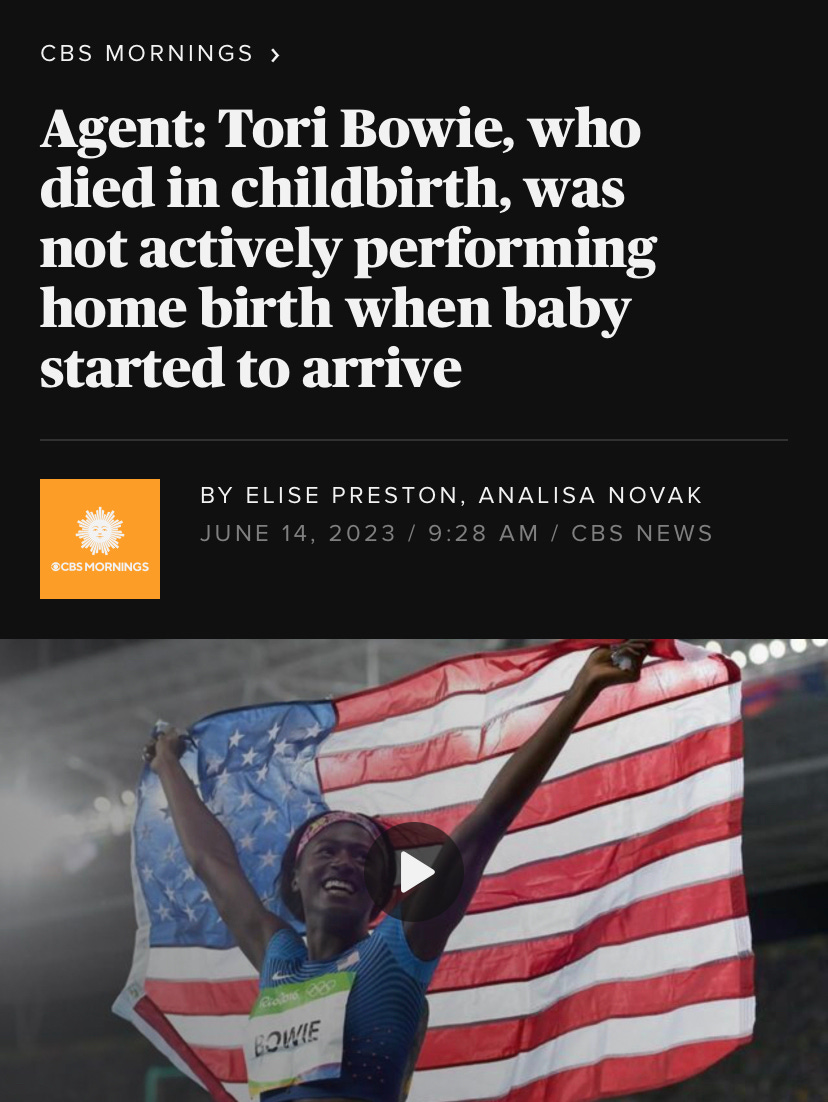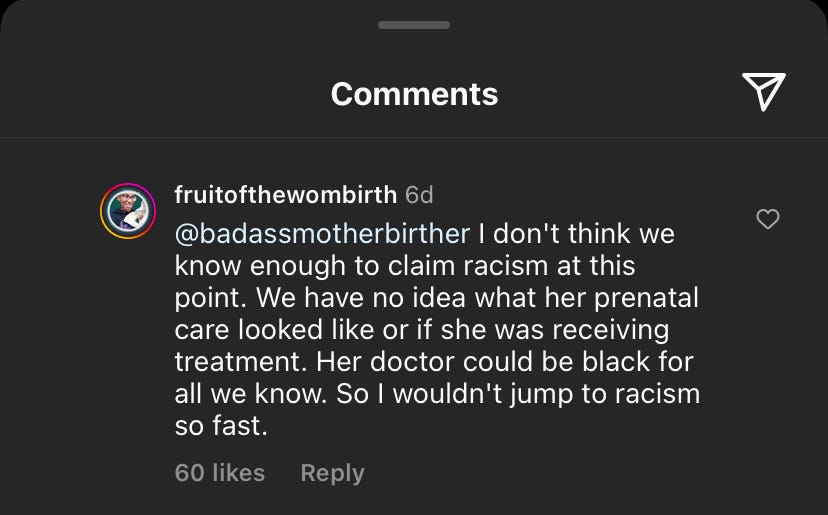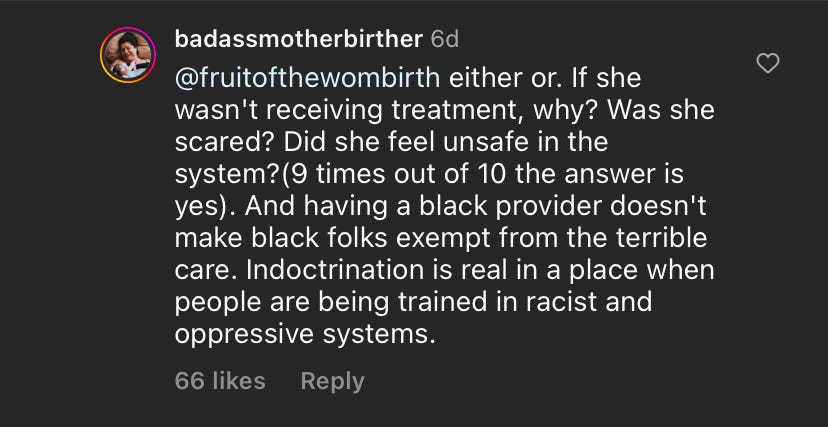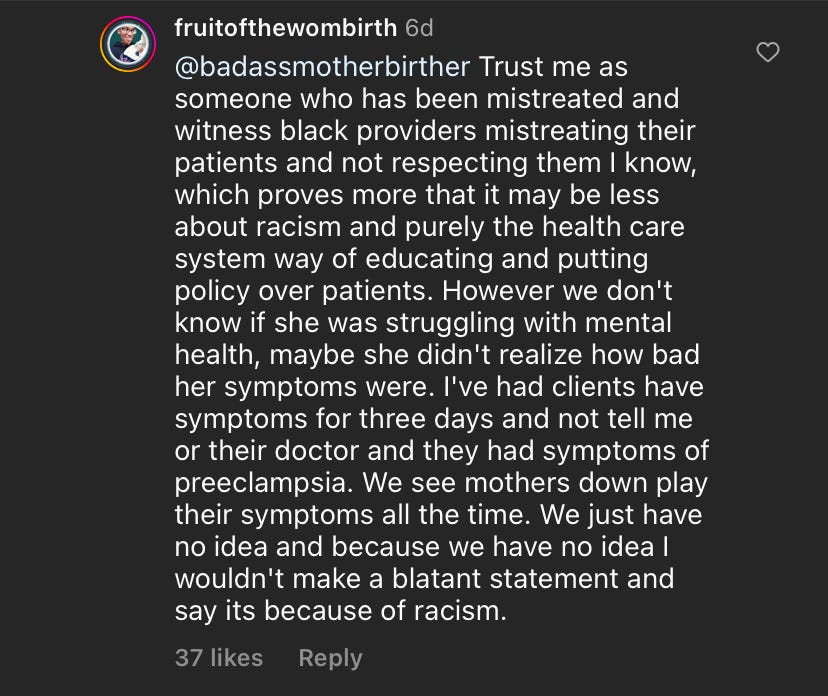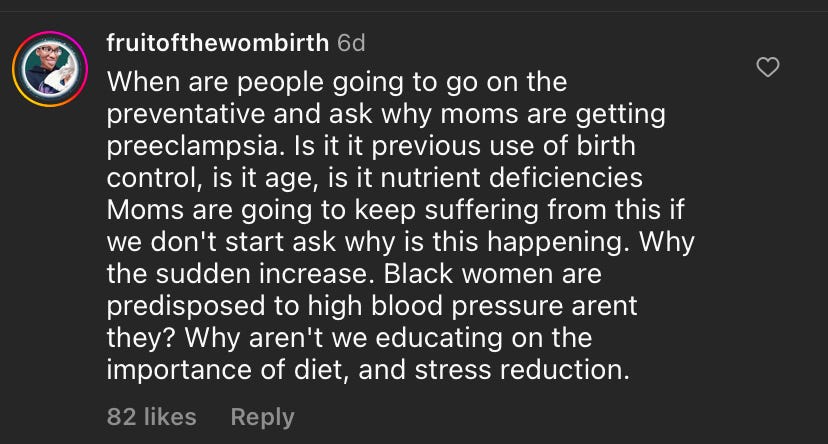What I mean when I say "every Black maternal death is the result of racism"
On Tori Bowie and what the conversation gets wrong
Content warning, especially for the Black comrades here: this article discusses the Black maternal death and the maternal mortality crisis in this country. If you’d rather protect your peace than read about this topic, please skip this newsletter. After all, as those who do read will see, this is not an individual “knowledge is power” kind of situation. In fact, there are no individual solutions to this problem; there are only communal ones. What is most likely to help address the abysmal maternal mortality rate in the United States is for non-Black communities to center the health, care, and joy of our Black siblings — in birth and beyond. Lastly, I want to extend my deepest condolences to the family, friends, and fans of Bowie: this was an incomprehensible, premature, and preventable loss.
Last week, the tragic news broke that the death of 32-year old elite athlete Tori Bowie, announced back in May, was the result of pregnancy-related complications. Specifically, the autopsy report showed that Bowie was both in labor at the time of her death (though the specifics of that are unreported) and suffering from eclamptic seizures (the likely cause of her death).
I have not been able to stop thinking of Bowie, laboring alone in her house, with eclampsia — a condition an OB I once worked with referred to as “something you should never see outside of the third world” — since. Having spent so many hours in that liminal place between life and death, the idea of someone traveling through that space, crossing from one to the other, alone is a special kind of stark and haunting heartbreak. I would never deign to even imagine what type of fear, despair, loneliness, strength, mistrust, trust, hopelessness, hope, love, abjection, or confusion went into those moments. I know every feeling was valid and does not need us to justify or imagine or understand it. I also know the outcome was preventable and that we, as a country, failed Bowie and her child.
In the aftermath, the usual conversations have ensued regarding the racial disparities in maternal mortality rates in the United States. As someone who has been reading and writing about this issue for over a decade, I find myself perpetually frustrated by these conversations because almost all of the time, even if they get the core argument right — that racial disparities in maternal mortality rates are the result of racism — they usually get the actual mechanism wrong. And then of course there are the conversations that miss the mark entirely:
Honestly, I’m not even going to address that article (if one can even call it such — the body does little to expand upon what is already stated in the title) or its grotesquely sensationalistic and misguided attempts to somehow connect Bowie’s death with the idea of homebirth, if only in people’s imaginations. What I instead want to clarify a little bit about what it actually means to say that the preventable deaths of Black pregnant and birthing people are the result of racism. Because typically what people understand when they hear that is racist providers cause those deaths, and while that may sometimes be true, it’s not the whole story. Because while that surely may be one thread in the web, in fact, it may not even be the thickest one.
A recent post and ensuing comments on BadAssMotherBirther — one of the most popular birth accounts on Instagram, with 806,000 followers — illustrates well the kind of thinking I am talking about. In the wake of headlines about Bowie’s death, Flor Cruz, the owner of BAMB, shared some of the questions "swirling in [her] head:”
I asked myself how eclampsia(preeclampsia left untreated) went unnoticed by her care team.
I asked myself if she had concerns, was seen and was told she was "fine" and sent home.
I asked myself if as a black woman she had been medically gaslit over and over.
I asked myself if she didn't feel safe asking for help within our racist system.
I ask myself if she was diagnosed with pre-e or eclampsia, why was it that her team sent her home without life saving interventions and only her family was concerned after a few days of not hearing from her.
I also why ask myself why this story is being portrayed as a death due to a complication of childbirth.
When we all know that these deaths are preventable and are a part of a racist, failing system in the United States.
Cruz hits on a number of issues in this post, all of them accurate. It is indubitably true that Black women are less likely to have their health concerns validated by the providers who “care” for them, in all settings (not just birth).1 It is indubitably true Black people are less likely to be offered certain treatments or interventions, in all settings.2 It is also indubitably true that there is a warranted suspicion and fear of the Medical Industrial Complex in the Black Community3, given that the MIC has a well documented history of having tortured, experimented upon, and lied to Black people for all of US history. It is also true that Bowie’s death being portrayed as the result of “complications of childbirth” rather than the complications of a “racist, failing” medical system is misleading at best and harmful at worst (because it perpetuates narratives around the implicit dangers of childbirth without holding the systems we have created and which are actually at fault accountable).
So I mostly agree with Flor, even as I do think her list of questions is incomplete. What I find more interesting, though, is some of the conversations her post engendered. Here is one of them:
There are so many issues in this little back and forth that it’s almost hard to know where to begin. But I want to start with how the commenter immediately assumes that in order to “claim racism” or “jump to racism” (both phrases that trigger me greatly, in full transparency) we must know that there was racist care or racist providers (the latter of which she also assumes can’t be Black. Dear readers: I know you know the idea that people who experience racism can’t also be racist is bullshit). This is an assumption that comes up again and again whenever there is a preventable Black maternal death. Each time, people search for the racist bad actor who ignored a Black person’s complaints or who made treatment decisions based in racist world views and beliefs.
The same commenter came back later, in an entirely different thread of comments, to hint at the second assumption that often comes up when we have these discussions, that of modifiable — but individual — risk factors:
And here’s where both of the common narratives coalesce. We typically want to think in terms of individuals: either individual bad actors in the form of racist providers or individual risk factors — this commenter alone points to mental health, age, nutrient deficiencies, birth control, diet, and stress reduction — in individual people that we need to “educate” or cure or fix in some way. The individuals are the problem we need to solve.
Both of these are narratives that are tidy and makes sense to us; we know many people are racist. We know that some people have risk factors. The first is a narrative that is easily solved: root out the racists and fire them. The second may not have as easy a solution, but it is a similarly simple explanation and equation; there is something obvious to blame and therefore, potentially, something to try to modify or fix. Maybe it’s as “simple” as not taking birth control! Maybe it’s as “simple” as eating more of a kind of nutrient or a little meditation for stress reduction! Both narratives, not coincidentally, also requires very little of us. We are not the bad apple providers. We can just tell someone “at risk” to try a meditation app. We don’t actually have to do anything uncomfortable ourselves.
Unfortunately, though, the truth is our maternal mortality crisis is not about individuals. It’s a communal issue, and resolving it requires the participation of entire communities. Because when we talk about racism influencing the maternal mortality rate in the US, we are actually talking about a complex, interlaced web of systemic and interpersonal racism — much of which is not even limited to the experience of pregnancy or birth at all. It is not being treated by racist providers that is killing Black women and people (though that may be happening, too); it is not any genetic “predisposition”or behavior or pre-existing condition in individuals.
It is the experience of living in a country infected by racism.
Keep reading with a 7-day free trial
Subscribe to Small Things Growing to keep reading this post and get 7 days of free access to the full post archives.





